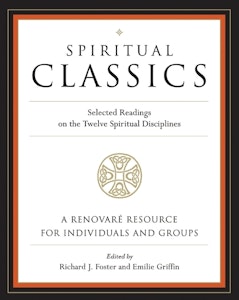 Excerpt from Spiritual Classics
Excerpt from Spiritual Classics
Meditation
“Meditation” is another word… people often use about prayer. But Christian meditation must not be confused with yoga, Eastern meditation or transcendental meditation. For, unlike these disciplines, Christian meditation has nothing to do with emptying our minds. Christian meditation engages every part of us — our mind, our emotions, our imagination, our creativity and, supremely, our will.
As Archbishop Anthony Bloom puts it, “Meditation is a piece of straight thinking under God’s guidance.” Yet it is not the same as an academic study of the Scriptures. This becomes clear when we listen to the Psalmist describing his practice of meditation.
On my bed I think of you,
I meditate on you all night long… (Ps. 63:6; JB [Jerusalem Bible])
The word for “meditate” which is used here means to “mutter” or to “murmur persistently,” repeating the same words over and over again. In Psalm 119, the Psalmist uses a different word when he refers to meditation.
I mean to meditate on your precepts
And to concentrate on your paths. (Ps. 119:15; JB)
Though princes put me on trial,
your servant will meditate on your statutes. (Ps. 119:23; JB)
I stretch out my hands to your beloved commandments,
I meditate on your statutes. (Ps. 119:48; JB)
The word he uses in these verses means “to muse,” to ponder,” “to reflect,” “to consider.” In other words, Christian meditation involves, not emptiness, but fullness. It means being attentive to God. The purpose of this attentiveness, this reflecting and this pondering is, among other things, to see ourselves in the light of God’s revealed word — just as Jesus weighed each of Satan’s subtle temptations against the teaching of the Old Testament.
We meditate to give God’s words the opportunity to penetrate, not just our minds, but our emotions — the places where we hurt — and our will — the place where we make choices and decisions. We meditate to encounter the Living Word, Jesus himself. We meditate so that every part of our being, our thoughts and our affections and our ambitions, are turned to face and honor and glorify him. Yet another reason for learning to meditate is so that we may become conversant with the will of God…
How to Meditate
We have seen that the English word “meditation” may be variously translated by words like muttering and murmuring, reflecting and recollecting, musing and pondering. With these hidden meanings in mind, it becomes apparent that Jesus meditated on the Scriptures. He knew the Old Testament so well that he easily made the connection between biblical truth and what was happening to him at various stages of his life. In Luke 4, three times Satan tries to deflect him from doing God’s work in God’s way; three times he combats Satan’s suggestions by quoting Scripture:
The devil led him up to a high place and showed him in an instant all the kingdoms of the world. And he said to him, “I will give you all their authority and splendor; it has been given to me, and I can give it to anyone I want to. If you worship me, it will all be yours.”
Jesus answered, “It is written: ‘Worship the Lord your God and serve him only.’ ” (Luke 3:5 – 8; NIV)
Here Jesus is revealing that Deuteronomy 6:13 has become so much a part of his thinking and behaving that it automatically springs to mind and affects his attitude when faced with Satan’s subtle ploys.
Scripture can similarly become a part of our make-up if we meditate on it. And the best way to prepare to meditate is to respond to the invitation God gives us through the Psalmist: “Be still, and know that I am God” (Ps. 46:10).
In the stillness we can shed some of the pressures which would prevent us receiving God’s Word into the innermost core of our being. We can focus away from the mundane and the everyday and onto God. Such stillness is to Bible reading what preparing the soil is to good farming. Essential for fruitfulness.
When we have become still, if we read a passage of Scripture which we have previously studied or some verses which refer to something which is troubling us, we may well find that a verse or a phrase or a sentence or a pen picture will draw us to itself. If it does, there is no need to read on. Instead, we should stop to reflect and to treasure the words, to turn them over and over in our minds, repeating them until the truth which they contain trickles from our head into our hearts.
All our faculties can be enlisted to help us meditate. The mind enables us to understand what the words mean as we read them in context. The memory helps us recall what we have learned and experienced of God’s character and faithfulness in the past. The imagination is a God-given gift which the prophets used to picture the insights God entrusted them with and which Jesus used to describe his kingdom. (So he likens his Father to a faithful shepherd, a Middle Eastern house-wife and a loving, Middle Eastern father, Luke 15.) And the emotions enable us to identify with the characters in the passage we are reading.
Excerpted from Spiritual Classics: Selected Readings on the Twelve Spiritual Disciplines Richard Foster and Emilie Griffin, Editors. New York: HarperCollins, 2000.
Photo by Kelly Sikkema on Unsplash
Text First Published December 1999 · Last Featured on Renovare.org August 2023


